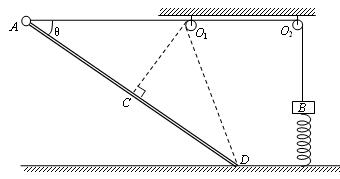如图所示,质量mB=3.5kg的物体B通过一轻弹簧固连在地面上,弹簧的劲度系数k=100N/m.一轻绳一端与物体B连接,绕过无摩擦的两个轻质小定滑轮O1、O2后,另一端与套在光滑直杆顶端的、质量mA=1.6kg的小球A连接.已知直杆固定,杆长L为0.8m,且与水平面的夹角θ=37°.初始时使小球A静止不动,与A端相连的绳子保持水平,此时绳子中的张力F为45N. 已知A O1=0.5m,绳子不可伸长.现将小球A从静止释放(重力加速度g取10m/s2,sin37°=0.6,cos37°=0.8)。求:

小题1:在释放小球A前弹簧的形变量;
小题2:若直线C O1与杆垂直,求物体A运动到C点的过程中绳子拉力对物体A所做的功;
小题3:求小球A运动到底端D点时的速度.
小题1:0.1cm
小题2:7J
小题3:
(1)释放小球A前,物体B处于平衡状态: 得
得
故弹簧被拉长了0.1cm
(2)小球从杆顶端运动到C点的过程,由动能定理:

 而
而
物体B下降的高度
由此可知,此时弹簧被压缩了0.1m,则弹簧的弹性势能在初、末状态相同。
再以A、B和弹簧为系统,由机械能守恒:
对小球进行速度分解可知,小球运动到C点时物体B的速度
由以上几式联立可得:
(3)因杆长L=0.8m,故
故DO1=AO1,弹簧的伸长量依然为0.1m.,与最初状态相比,弹簧的弹性势能相同,物体B又回到了初始位置,其重力势能也与最初状态相同。
在D点对A的速度进行分解可得:
由机械能守恒:
联立可得小球A运动到杆的底端D点时的速度:
